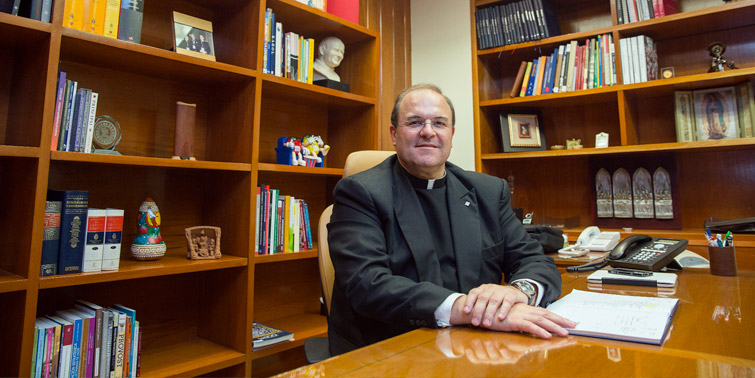Born in Talavera de la Reina, Spain, in 1958, with an academic background in Philosophy and Theology, Fr. Cipriano Sánchez García, LC, is the new Rector of Universidad Anáhuac México Norte since November 5th.
“I arrived in Mexico in October 1989. I started working first with the adult groups in the west and south zones (Mexico City) of Regnum Christi, and that revealed a facet I hadn’t worked in before, but I found it very interesting. I am referring to the family sphere, in general, to the world of counseling and spiritual direction for adults,” he comments.
How does Fr. Cipriano Sánchez like to work?
I really enjoy working in teams; it is my fundamental working style. It’s not a solitary style but a collaborative effort to build teams. Delegating, training, empowering, taking responsibility, participating, trusting, and listening are verbs I really like to work on with the people who collaborate with me.
The newly appointed Rector faces the challenge of leading a community of over 13,000 students and 37,000 alumni. What does it mean to be Rector of Universidad Anáhuac?
It is a great responsibility to be at the forefront of a university community, especially one so deeply rooted. Let’s not forget that Universidad Anáhuac celebrated its 50th anniversary last year, and therefore, it is an institution that, although young compared to much older universities, has gained weight through its image, quality, prestige, excellence, and leadership within Mexican society.
Within the Mexico North Campus, I served as Vice-Rector Academic from December 2014 until November of this year, when I assumed the role of Rector. In that position, I discovered the great richness within the university: human, academic, professional, and institutional. Moreover, I believe this challenge involves broadening horizons.
During my time leading this university community, I will contribute what I have always done: my way of working, my way of pushing, motivating, building teams, my way of striving with quality—all of this to be carried out within this university field.
His doctoral thesis focuses on the analysis of postmodern society. In this regard, a fundamental aspect of the university’s mission is the comprehensive formation of students. How do you prepare new students in today’s society?
Today’s youth are seeking to discover themselves—what is their own way of being, what is the richness they carry within and can contribute. I feel that our role as a university community is to accompany them. Comprehensive formation is not a piece that I can simply implant in a person; it’s a kind of radar that must discover who you are and, from that, guide you toward the best of yourself.
The fact that we have other experiences, such as sports, arts, social action that breaks with individualism, evangelizing missions, sharing one’s faith, etc., form a mosaic where the university doesn’t just give you bits of information but provides a complete life formation to foster communities throughout their stay.
We must recognize that young people hold precious values such as friendship, generosity, solidarity, freedom, and the dignity of others. Our role as an institution is to accompany them and show them the path of hope, which will make them better.
You have a deep knowledge of media; you hosted the weekly radio program “Hombre nuevo edificando la familia” on 1030 AM from 2004 to 2013, for Grupo Radio Centro. Additionally, you have collaborated on religious and values-based programs on Televisión Azteca since 1999. In this sense, you also have an active presence on social media, with a personal blog, Facebook, and Twitter. What do you consider the role of social media today?
Social media itself is a rich challenge. Some people demonize social media or misuse it; it’s a challenge that makes us ask: what do I have inside to give you? And what do I use precisely to share it? They are tools that ultimately lead a person to ask: what do I have inside to give? They are wonderful; they are a tool that human intelligence has given us, allowing us to connect not only with the person next door but with the continent next to us.
During the inauguration of the rectory, you presented your strategic plan, based on four pillars: Catholic identity and comprehensive formation, recognized and accredited academic quality, institutional development, and effective management. In this regard, what are the main challenges facing our university, and where is it headed?
Universidad Anáhuac is a very consolidated university. Father Jesús Quirce left and strengthened it, which is a significant and interesting merit. I am considering four major aspects for the institution in this plan:
- Shared responsibility as a university community, where each Director of School or Faculty, area, or office, is an authentic leader of positive action.
- Strengthening comprehensive formation and Catholic identity.
- Academic excellence, focusing mainly on three areas: research, internationalization, and innovation.
- Human talent—ensuring that those who collaborate within the institution remain and that, in the coming years, our university achieves better results in an environment of shared responsibility and participation.
Quality, demanding standards, and personal responsibility are the engines driving us toward achieving our goals. We can be part of the solutions, and that is the path we plan to follow because Mexico needs it, and it needs much of what Anáhuac can offer, especially through its people—young men and women who graduate from here.
The Universidad Anáhuac network is present in Mexico, Tamaulipas, Mérida, Cancún, Puebla, Oaxaca, and Xalapa. We are a community. What would you say to them?
One thing we’ve discovered in recent years is that, as the Anáhuac Community or the Network of Universities of Regnum Christi, we are not alone. We can generate operational harmony, content, and mission— the latter being the most important—knowing that all universities are working within the same evangelizing mission. As a Catholic university, we want to make a proposal for dialogue and presence in a society that is increasingly lost.
I would like, over time, for Anáhuac’s leadership—as I mentioned in my inaugural speech—to be characterized by a great capacity to serve, to be attentive to everything others need, so that with all our wealth and potential, we can be much more efficient and effective in helping those in need.
The Rector’s quick favorites
What do you like to read? Tolkien’s books. I’ve already read Harry Potter. I like writers from the Spanish Golden Age, undoubtedly the writings of Pope Francis and Octavio Paz, among others.
What sport do you like? I played a lot of basketball, paddle tennis, and now I walk and swim. I like American football and soccer when a match warrants it.
What music do you like? Yo-Yo Ma, Mexican music, Alondra de la Parra (as a conductor of Mexican classics), Mexican folk music, and The Beatles.
Whom do you admire? I greatly admire Our Lord Jesus Christ and the last three Popes, including Pope Francis; and Steve Jobs, with his limits.










